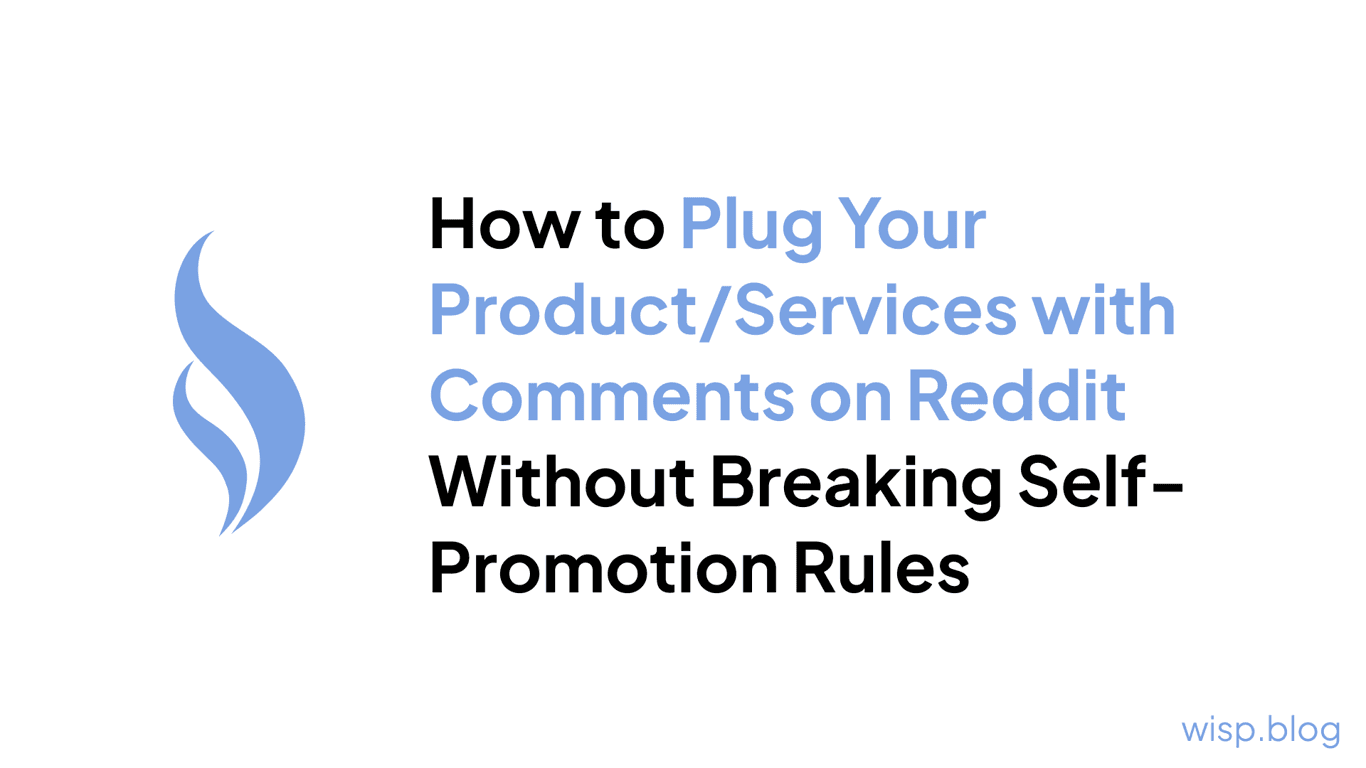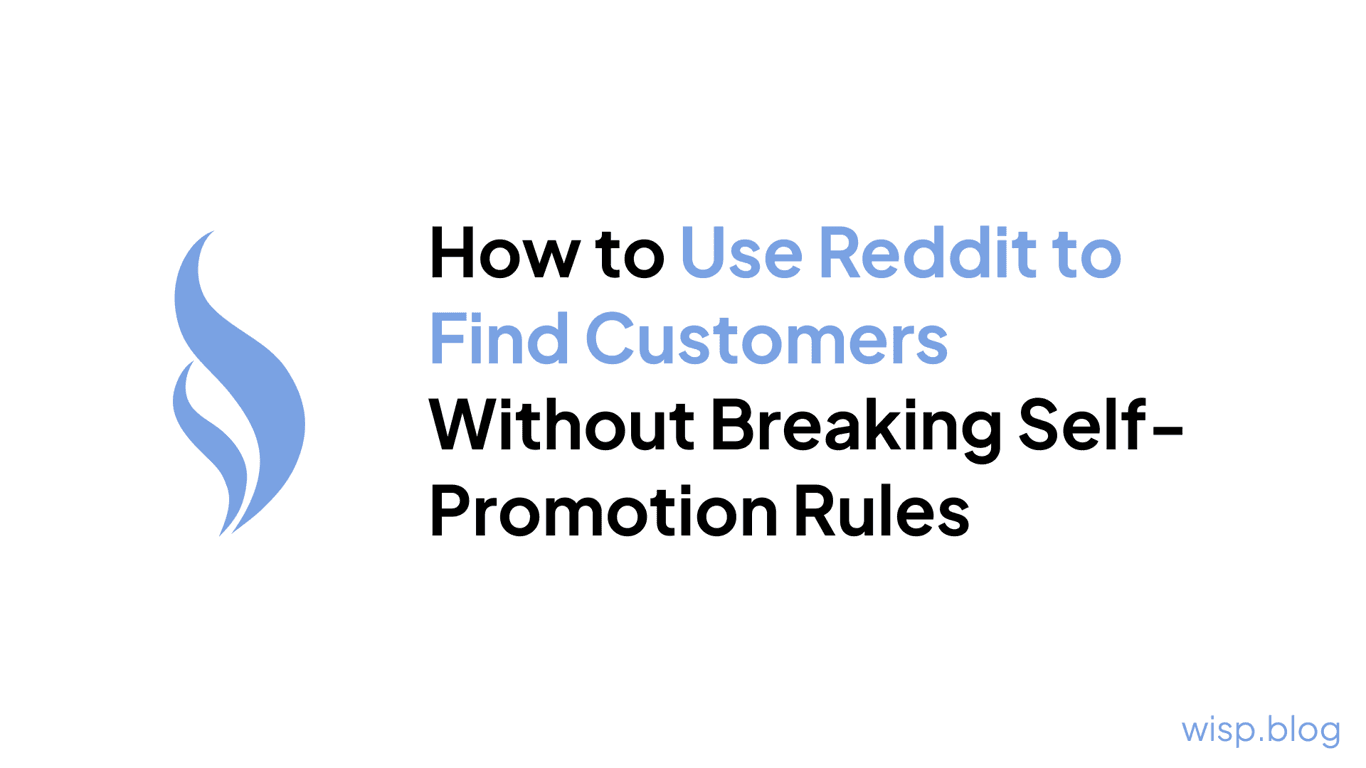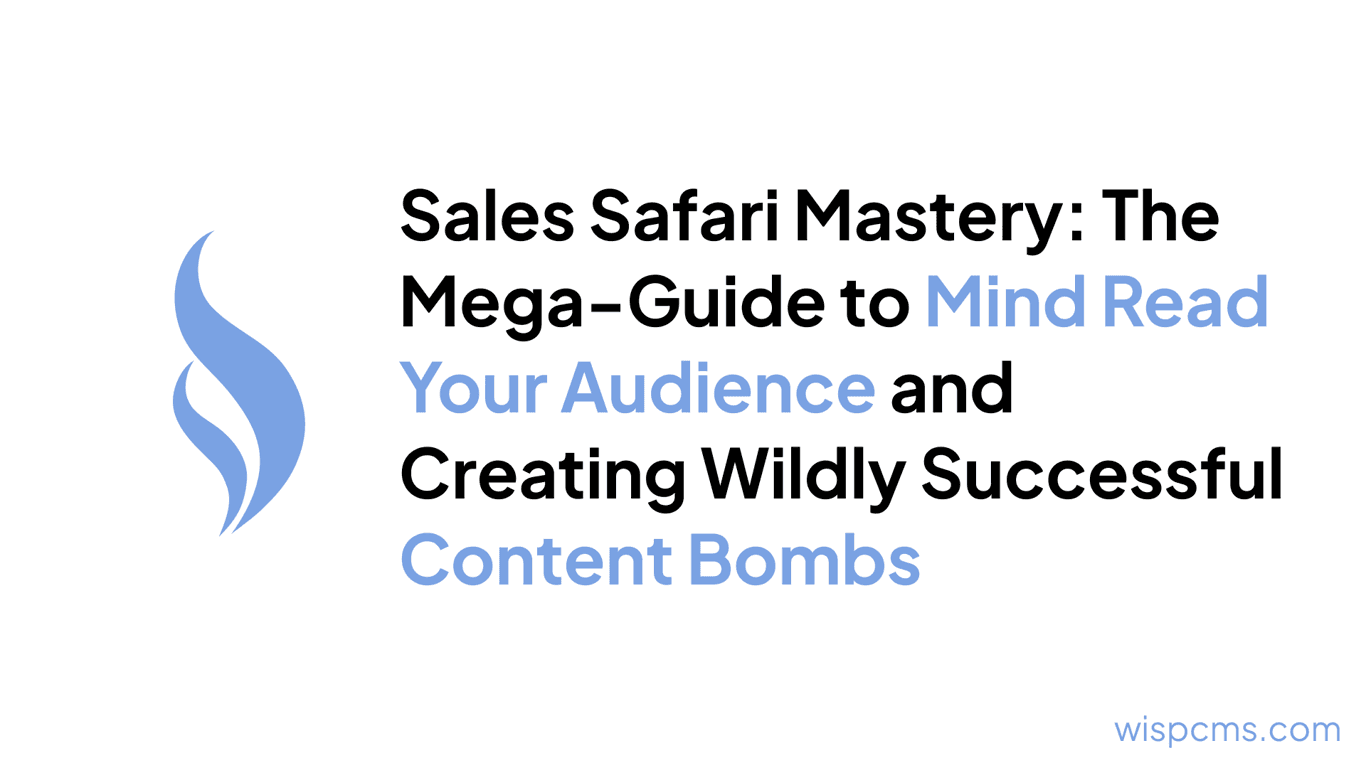
You've got a great product or service, but finding those first few customers feels like pulling teeth. Traditional marketing and sales tactics don't seem to be working. You're sick of hearing crickets after countless cold calls and emails get ignored or marked as spam.
Deep down, you know your offering could be a game-changer for the right people. But they're scattered across different online communities, forums, and subreddits. How can you effectively reach them where they already are and turn their engagement into paying customers?
It's frustrating putting in all this effort trying different customer acquisition strategies, but still struggling to gain traction. You've tried Google and Facebook ads, but the cost per acquisition is through the roof with a low return. SEO and content marketing feel like slow burns that won't pay off for months or years.
You crave that feeling of making your first sale to a real, paying customer who truly values what you've built. But the fear of wasting more time and money on ineffective tactics is holding you back from your next marketing move. Part of you wants to just build it and hope they come, but you know that passive approach rarely works.
What if I told you there was an under-the-radar approach to finding customers by immersing yourself in the very online communities they frequent? A way to genuinely connect with your target audience, build trust and authority, and have them practically begging to become your customer?
It's called "hacking" online communities and forums like Reddit. By going where your prospects already congregate, you can observe their natural behaviors, pain points, and language. You can then apply those insights to create irresistible offers and nurture them into customers. No more renting their attention through ads - you'll own it.
1. Find Your Target Subreddits and Communities
The first step is to identify the specific subreddits, forums, Facebook groups, Discord servers, and any other online communities where your ideal customers hang out. These are the virtual water coolers you need to immerse yourself in.
How to Find Subreddit Communities
Reddit's own search functionality is a great starting point for finding relevant subreddit communities. Use search operators like:
"keyword" + "subreddit"
"keyword" + "reddit"
site:reddit.com/r/ "keyword"
This will surface existing subreddits related to the topics and keywords you enter. You can then browse them to see which have the most active communities discussing subjects relevant to your product or industry.
In addition to Reddit search, use third-party tools and curated lists to find more niche subreddit recommendations:
Redditlist - Browse popular subreddits by category
Saidit - Search across all of Reddit
FindAReddit - Discover new subreddits based on your interests
r/FindAReddit - Ask this community for subreddit recommendations
Crowdvalence - Advanced reddit search with multiple keywords, negative keywords, multiple subreddit filtering, excluding subreddits, and filters by upvote/comment count.
Reddit Map - Find adjacent subreddits which might be more relevant to your interest/community
As you browse the results from these sources, look for subreddits that check the following boxes:
High number of members (ideally 10,000+)
Frequent new posts and comments (at least 5-10 per day)
On-topic, relevant discussions happening
Strict moderation to maintain quality
Make a list of at least 5-10 subreddit communities that fit this criteria to start with. You'll want to immerse yourself where your target audience congregates.
Finding Other Online Communities
While Reddit should be a primary focus, don't neglect other popular online communities where your prospects may gather:
Facebook Groups - Use the search bar to find relevant public and private groups
Discord Servers - Try searches like "discord server" + "your keyword"
Slack Communities - There are many niche Slack communities; find lists for your industry
Niche Forums - Search "your keyword" + "forum" to find topic-specific forums
LinkedIn Groups - Explore the Groups section for your industry topics
Subreddits - Yes, you can find community recommendations on Reddit itself!
The process for vetting these non-Reddit communities is similar. Look for an active membership, frequent conversations happening, moderation quality, and strict rules against excessive self-promotion.
Pro Tip: Use keyword modifiers like "best", "top", "list" etc. to find curated lists of communities to join from sources you trust.
Common Pitfall: Trying to join and participate in too many communities at once. Start with your top 5-10 for best results.
2. Become an Active Community Member
You can't just barge into these communities and start blasting promotions from day one. The members will sniff out that self-interested motive from a mile away and reject you. Instead, you need to earn their trust and respect first by becoming an active, value-adding member.
The Observation Phase
Spend at least 2-4 weeks just observing each community's culture before actively participating. Pay close attention to:
Group norms, rules, and moderator instructions
Language, slang, and inside jokes members use
Frequently asked questions and recurring themes
Most popular types of posts and comments
What gets the most engagement (upvotes, comments, etc.)
Take diligent notes during this reconnaissance phase in a journal or document. You're aiming to deeply understand the community's vibe and what they truly care about.
For example, you may notice that memes and humorous posts get way more traction than self-promotion in one subreddit. Or that questions framed a certain way tend to spark much more discussion in a Facebook group.
Pro Tip: Use a tool like Skim.it to automatically summarize the top posts and comments from any Reddit community. This makes your observation more efficient.
Actively Participating
Once you've calibrated to the culture and norms, start engaging through comments and posts that provide genuine value - not self-promotion. A few ways to do this:
Ask insightful questions that spur discussion
Provide helpful tips, feedback, or advice to others
Share relevant insights, stories or personal experiences
Celebrate wins and provide encouragement
Call out high-quality posts or comments
The key is to be an active force for good within the community. The more value you create upfront through your genuine participation, the more credibility and trust you'll build.
Common Pitfall: Coming on too strong with self-promotion before building any reputation. This is an instant way to get banned or ignored.
Pro Tip: Identify the top contributors and engage with their posts/comments. Make friends with influential members who can voucher for you down the line.
3. Identify Customer Pain Points and Opportunities
As you immerse yourself in these communities through observation and participation, you'll gain an intimate understanding of the members' biggest struggles, frustrations, desires, and unmet needs. These are the "customer pain points" your product or service can potentially solve.
Tracking Pain Points
Pay close attention to any patterns you notice in the types of questions, rants, advice, or solutions that people frequently seek out. Use a tool like Airtable or Notion to create a database for tracking and organizing all these potential pain points.
For each pain point you identify, make notes about:
How it's phrased or described (use their words verbatim)
What context or situations seem to trigger this pain
Demographic details about who seems affected
Any other nuances, examples, or context provided
You can also set up RSS feeds or email alerts for whenever new posts get made in the community using certain keywords related to your product's pain points. This allows you to easily monitor for new insights over time.
In addition to tracking stated pains, also look for implied or hinted at desires that people don't directly express. For example, you may notice lots of people sharing productivity hacks or apps they use to get more done. This could imply a bigger, unmet need for better productivity solutions.
Mapping to Your Solution
As you accumulate a treasure trove of pain point data from multiple communities, start mapping how your product or service could potentially solve or fulfill those needs.
Look for any new use cases, feature opportunities, or messaging angles you hadn't previously considered. There will likely be plenty of "a-ha!" moments where you see your offering with a fresh new lens.
For example, let's say you sell project management software. You may discover that a number of community members frequently complain about bloated, complicated PM tools that have too many bells and whistles. This could inspire you to emphasize how your product is "lightweight and simple" rather than loaded with every feature under the sun.
Common Pitfall: Only looking for verbatim confirmations that your product solves XYZ, rather than implied, hinted needs.
With a solid understanding of your target communities and their core needs, you'll be well-equipped to create irresistible lead magnets and marketing materials that directly speak their language. We'll cover how to do that in the next section.
4. Create "Mindreading" Lead Magnets
With all the pain point insights and native language you've gathered from being embedded in your target communities, you're ready to create irresistible lead magnets. But these can't be generic, entry-level resources that your audience has seen before.
Leverage Insider Intel
The key is to leverage all the jargon, real-world examples, and specific knowledge you've accumulated from your community immersion. You want to create mindreading content that immediately makes your prospects think "Whoa, it's like this was plucked from my brain!"
For example, if you sell productivity tools for marketers, you could create "The Overworked Marketer's Guide to Reclaiming 10+ Hours Per Week." Pack it with:
Relatable descriptions using their jargon ("Sick of spending half your day whac-a-moling random requests from Karens in Sales?")
Specific pain points you've observed ("Struggling to find time for deep work when you're getting Slacked every 5 minutes?")
Inside jokes or references only they'd understand ("How to finally kick your MailChimp monkey once and for all")
Step-by-step solutions tailored to their roles and workflows ("7 Zaps to automate all those pesky campaign builders")
The more niche, customer-intimate, and "mindreading" your lead magnet is, the more it will resonate. It's like a giant electrified sign that screams "This is the solution you've been looking for!"
Lead Magnet Format Options
While guides and ebooks are classic lead magnet formats, you have plenty of other options to get creative:
Checklist or cheat sheet
Toolkit or resource bundle
Quiz or assessment
Swipe files or templates
Video course or webinar
Private community or Slack group
Free tools, apps or software
Code or design templates
Lists of [directories/tools/apps/etc]
Workflow, recipes, notion templates
The format doesn't matter as much as the quality of the content and how hyper-relevant it is to your target audience's specific needs and vernacular.
Common Pitfall: Creating generic, basic lead magnets that don't make your audience feel understood.
Pro Tip: Collaborate with active community members to co-create lead magnets. They'll ensure you nail the authenticity.
5. Promote Lead Magnets Within Communities
With your mindreading lead magnet ready, it's time to start promoting within the communities themselves. But again, don't just drop a link and dip - that's a surefire way to get banned or ignored.
Understand Community Rules
First, make sure you deeply understand each community's rules and norms around self-promotion. Some may:
Require getting moderator approval first
Designate weekly/monthly threads for promotions only
Allow self-promotion but with strict instructions
Have karma or account age requirements
Thoroughly read through the rules and FAQs. You may even want to reach out to moderators beforehand to clarify anything unclear and get on their good side as a trusted member.
Provide Value First
When you do promote, don't just drop a link - that's a rookie mistake. Instead, provide value first by participating in the discussion authentically:
Offer helpful advice or feedback to the original poster
Ask insightful follow-up questions that further the conversation
Share relevant personal experiences or examples
Provide additional context, resources or insights
Only once you've added substantive value to the conversation should you casually mention having a free, relevant resource to help with the topic at hand. Something like:
"By the way, I put together a guide on [PAIN POINT] that covers some of what we discussed. It's free, no strings attached - just DM me if you'd like a copy!"
Use Monitoring Tools
Constantly manually searching for relevant threads to jump into is tedious and inefficient. Instead, use a tool like F5Bot to automatically monitor for mentions of your keywords across Reddit and other communities.
F5Bot will send you alerts of posts and conversations happening around the topics and terms you specify. This allows you to easily identify promising threads to participate in with value and promote your lead magnet in a relevant, contextualized way.
You can also use F5Bot to monitor your own brand name and product names to join any conversations where you're being discussed.
Common Pitfall: Blindly promoting without reading community rules or participating first. This usually gets your post removed or accounts banned.
Pro Tip: Reach out and build relationships with moderators, who can allow some self-promotion if you're a trusted member providing value.
6. Nurture Leads into Customers
Your mindreading lead magnet has worked its magic, and you've got a nice little pool of prospects who opted in because it spoke directly to their needs and pain points. Now you can nurture them through an automated email funnel towards becoming paying customers.
Continue the Mindreading
In your nurture sequence, continue using the same jargon, voice, and deep understanding of their world that made your lead magnet so appealing. Provide more valuable advice, social proof from others in their community, and reasons why your product is the perfect fit.
For example, your first email could be titled something like:
Okay, so you grabbed my [LEAD MAGNET]... here's what to do next, [PERSONA NAME].
Then open up with some mindreading like:
I know what you're probably thinking after reading [QUICK SUMMARY OF PAIN POINTS COVERED]. You're relieved to finally have a gameplan for [ACHIEVING THEIR DESIRE]. But you're also wondering...
From there, you can overcome common objections and roadblocks by sprinkling in case studies, testimonials, and success stories from other customers they can relate to. This builds even more trust and desire around your offering coming from a place of true understanding.
Make the Pitch
When you finally make the sales pitch, don't just ask for the sale. Overcome final objections by highlighting unique benefits and outcomes tailored to their specific needs and wants that you've intimately discovered.
For example:
As a [PERSONA NAME], you already know [COMMON FRUSTRATION] and [ANOTHER COMMON FRUSTRATION]. That's why [KEY BENEFIT 1] and [KEY BENEFIT 2] are so crucial. Our [PRODUCT NAME] is the only [CATEGORY] that [UNIQUE DIFFERENTIATOR].
Use a tool like Deadline Funnel to add urgency and scarcity with limited-time offers, bonuses, pricing, and other incentives. Those who have been nurtured through this ultra-tailored, community-centric funnel will be primed and eager to take advantage.
Pro Tip: Offer an exclusive discount or free trial just for that specific community. This makes them feel special and appreciated.
7. Rinse and Repeat
Once you've earned those first few customers from hacking a particular community, you can deploy the same process across other relevant communities. Immerse, observe, create mindreading content, nurture, and convert.
You can also leverage your existing customers for case studies, testimonials, and referrals to their community peers. Those social proof assets will make it even easier to build credibility and trust with each new community you engage.
Over time, create an arsenal of ultra-tailored lead magnets and marketing assets for all the key communities where your customers congregate online. This allows you to perpetually attract and convert your ideal prospects at scale through systematic execution.
Document and Systematize
Create templates, checklists, and playbooks for each step of this community hacking process so you can rinse and repeat seamlessly across new audiences.
For example:
Lead magnet creation brief and outline
Swipe files of high-converting community promotion scripts
Automated nurture funnel sequences and email templates
Standardized case study and testimonial templates
Checklists for finding and vetting new communities
The more you document and systematize this system, the more you can scale and remain consistent as you penetrate new communities.
Common Pitfall: Failing to document and systematize this process for consistent execution across new audiences.
Pro Tip: Create a content hub like a blog or resource center to house all your lead magnets and community-tailored marketing assets. This makes everything easily accessible and shareable.
While most businesses wildly blast outbound promotion after promotion, you'll have strategically embedded yourself into the fabric of your customers' lives. You'll be the trusted authority who intimately understands their world and crafts perfect solutions just for them.
No more renting their attention through interruptive ads or time-consuming cold outreach. By hacking the very communities they call home, you'll own a piece of their mindshare and buying journey. You've turned your customers' online hangouts into a 24/7 sales and marketing engine that perpetually works for you.


